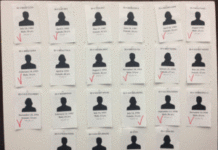The Diseasing of Defiance
Is every defiant child a freedom fighter? Of course not. Disrupting your fourth grade class is not the same as embarking on the underground railway. But is oppositional defiant disorder a label meant to subjugate and to serve the needs of the authorities? Yes, absolutely.
New UN Report: Steps Forward, But No End to Impunity
Dainius Pūras, UN Special Rapporteur on Health, has issued a groundbreaking new report critiquing biopsychiatry and its reliance on coercion, yet he pulls his punches, most unforgivably by treating the obligation to end coercive practices as a matter for gradual rather than immediate implementation.
Smash the Blue Lights: Autism Speaks is a ‘Danger to Self and Others’
There are few around Mad in America territory who would argue against the dangers of the National Alliance for Mental Illness. But as a movement, we often fail to recognize the dangers of their much younger sibling named ‘Autism Speaks’.
Oliver Sacks Helps Me Explain Hypersensitivity
In this passage Oliver Sacks writes about an altered state in which the capacity of the smell sense opens up. That is what it’s like for me all the time — hypersensitivity. I have this sort of acute capacity with all my senses all the time… it’s overwhelming, and it’s also the source of all my healing.
Nassir Ghaemi and The Psychological Fallacy
Rogue psychiatrists are straying from orthodoxy by expressing the belief that people who are burdened by excessive loss or difficulties are understandably depressed, and therefore not "diagnosable," but Dr. Ghaemi is bringing them back to the fold in the fine tradition of psychiatric pedagogy.
Neuroqueering Judaism: Reflections on Mad Passover
For our Haggadah, the reading material that guides the Seder activities, we included a list of the 10 modern plagues: psychiatric incarceration, forced drugging, electroshock therapy, restraint, seclusion, coercive behavior therapies, outpatient commitment, the pathology paradigm, sanism, and societal coercion to recover.
Change in Chicago: Playing Go
The jury was out for days. And when they came back it became clear they were wrestling with the issue of who to blame. This was like playing Go, where it can look like the black counters on the board have white encircled until white puts down one more piece and all of a sudden it wins.
Inconvenient Truths About Antipsychotics: A Response to Goff et al
The most worrying thing about the Goff et al paper is the minimisation of the evidence that antipsychotics produce brain shrinkage. There are no studies that show progressive brain changes in people diagnosed with schizophrenia or psychosis in the absence of antipsychotic treatment.
Responding to Claims that the Benefits of Antipsychotics Outweigh the Risks
For my doctorate research, I talked with 144 people who take or have taken antipsychotics and a third reported overall positive experiences. Another third said quite the opposite, and I can hear them yelling at me to share their side of the story.
Unusual Beliefs and Behaviors vs. Objective Realities and Truths
As a parent, and a child psychologist, and just as a person, I believe that acquiescing to the idea that we should simply help people “cope more effectively with things as they perceive them” falls short of the most effective and even most loving response.
Change in Chicago: The Dolin Verdict
Finally, faced with the twenty known and two possible suicides on Paxil during clinical trials, Dr. Kraus reluctantly conceded that 80% of the victims were over thirty. Whatever they had told the FDA, the risks of Paxil could not be confined to adolescents — and GSK knew it.
Wendy Dolin Takes on GlaxoSmithKline And Wins — For Now at Least
In July of 2010, Stewart Dolin, a partner at the mega law firm Reed Smith, jumped in front of a subway train in Chicago, apparently suffering from akathisia caused by paroxetine. His widow sued, and the jury found GSK negligent in not informing doctors of the suicide risk
“Let’s Talk Withdrawal” Podcast
Being in antidepressant withdrawal, I had come to feel very isolated and alone. What I needed was to hear real experiences of people who, like me, have struggled with the very drugs that they believed were going to help them. It was time to create a podcast.
Public Petition: Support for People Affected by Prescribed Drug Dependence
People from any country can sign our petition until May 10th, then it will be lodged for consideration and further action by the Scottish Parliament Petitions Committee. This promises to be an interesting process — one which we hope will have a much wider impact.
Trump Appoints Leader who Campaigned for Involuntary Outpatient Drugging
This appointee criticizes our social change movement, especially our dedication to empowering peer support and our concerns about psychiatric drugs and labeling. It is important for everyone who supports human rights to speak up and oppose this approach. Please phone your Senators to block this confirmation.
Our Letter to Lancet Psychiatry
This is the cover letter that Mad in America Foundation sent to Niall Boyce, editor of Lancet Psychiatry, requesting that the journal retract Martine Hoogman's study of "subcortical brain volumes" in those diagnosed with ADHD.
The Unforeseen Relationship: Psychiatric Medication and Spirituality
In 2015 I completed a qualitative research study exploring the interrelationship between psychiatric medication and spirituality. The key finding was that people were engaging spiritually with their prescriptions in ways that significantly impacted the course and outcome of recovery.
‘Enough is Enough’ Series: LSD Reconsidered
Biochemical psychiatry is now moving in an unfortunate, potentially dangerous, yet predictable direction. It has run out of new drugs to try, so it's turning to psychedelic drugs, suggesting that they hold promise in the treatment of substance use 'disorders.'
Opening a Dialogue about Early Psychosis Programs in the US
It is very encouraging to observe the spread of early psychosis programs to many states and communities throughout the United States. I hope that someday there are programs in all 50 states, not just 34, and that there are literally thousands of these programs not a hundred.
What if the Folly is in Us, Too?
Faced with behavior different from our own or from our expectations, all of us feel that urge to “do something”—an act that is one of the beginnings of prejudice, a malignant virus that all of us have trouble shaking free of. We doctors, especially, want to do something: It’s what we’ve been trained to do.
Anti-Authoritarian Options for Suicidal Anti-Authoritarians
Many teenagers and young adults (the group for whom suicide is the second leading cause of death) are anti-authoritarians. For them, the idea that they're experiencing a crisis of self rather than a mental illness can reduce their pain, increase their hope and open them up for dialogue.
The Downfall of Peer Support: MHA & National Certification
Mental Health America (MHA) has finally unveiled its new National Peer Specialist Certification over much protest. It is dangerous to what we call ‘peer support’ for MHA to have done this. Even if they did it well. Which, as best as I can tell, they did not.
Would You Want Your Therapist to be Honest?
If a therapist is honest about their triggers, they risk equalizing the power imbalance. They risk being on the same plane as their client. If the therapist has triggers too, they may end up being as “bad” as the client’s, and then what? Then who is the healer?
“Doubly Brutish”: Forensic Psychiatry and Force
It is difficult to imagine a system that could do any better at ensuring the failure of its patients, and in doing so it accomplishes the very opposite of what it claims — it increases risk for all concerned.
Emotional Pain and the Possibility of Finding Hope
The human need to not be left alone when we are suffering is very great. During such times our very basic human needs for being valued, seen, heard and cared about arise as we are at our most vulnerable and are dependent on the goodwill of others.

































